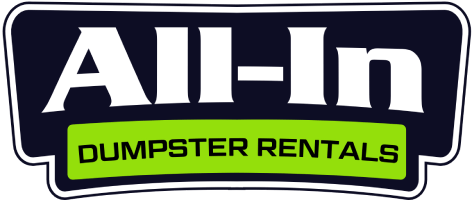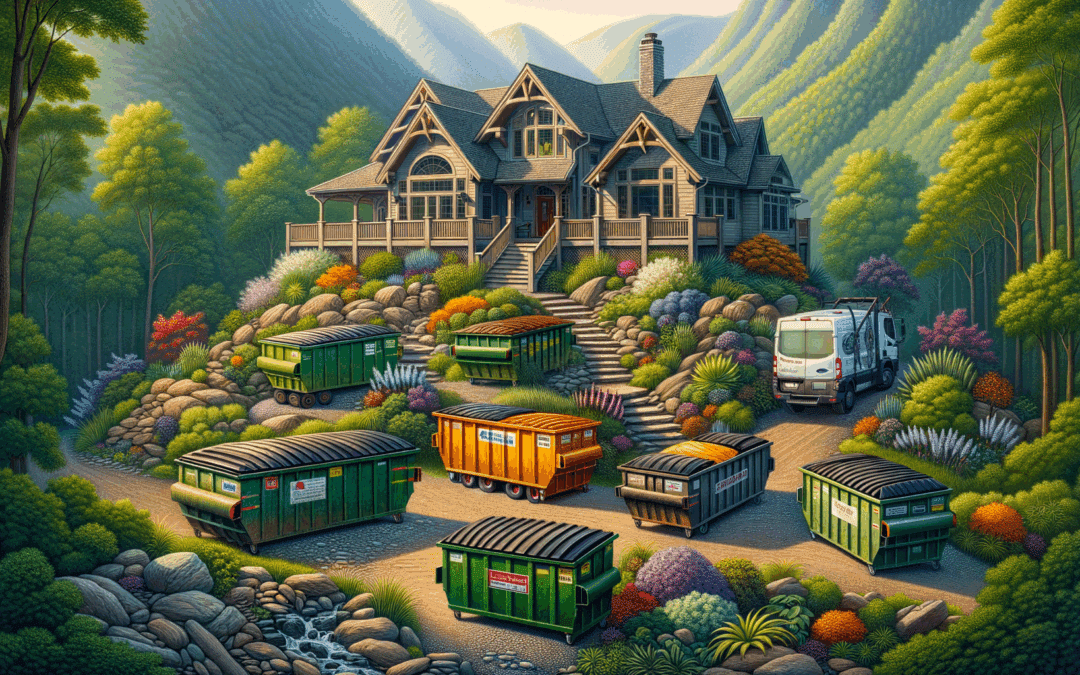As the Blue Ridge Mountains burst into their seasonal display of colors, Asheville homeowners turn their attention to landscaping projects that keep their properties as stunning as the natural surroundings. Whether you’re clearing overgrown areas, renovating garden beds, or tackling a complete yard transformation, one challenge remains consistent – dealing with the mountain of yard waste that accumulates faster than you might expect.
Here in Asheville and the surrounding counties of Buncombe, Henderson, Haywood, and Madison, our unique mountain terrain creates specific landscaping challenges that flatland residents simply don’t face. The combination of sloped properties, seasonal leaf accumulation, and our region’s tendency toward lush vegetation means that yard projects often generate substantially more waste than anticipated. As a local, family-owned waste management company serving this community, we’ve seen firsthand how proper waste planning can make the difference between a smooth project and a frustrating ordeal.
Let’s explore how to select the perfect dumpster for your landscaping endeavors, with guidance specifically tailored to our Western North Carolina environment.
Understanding Yard Waste: What You’re Really Dealing With
Before choosing a dumpster, it’s important to understand what constitutes yard waste. Unlike regular household trash, yard waste encompasses a variety of organic materials that have different disposal requirements and volume considerations.
Common yard waste from Asheville landscaping projects includes:
Tree branches and limbs are bulky but often hollow, taking up significant space while weighing relatively little. In our mountain communities, storm-damaged trees and routine pruning can quickly create substantial piles.
Leaves and grass clippings might seem lightweight, but they compact and become surprisingly heavy when wet – a common occurrence in our climate. A small pile of rain-soaked leaves can weigh significantly more than you might guess.
Root balls and stumps are among the densest yard waste materials. Even small stumps can weigh hundreds of pounds and require special consideration for disposal.
Soil and rocks often get mixed into landscaping waste when reshaping gardens or clearing areas. These materials are exceptionally heavy and can quickly exceed weight limits if not properly accounted for.
Plants and bushes vary widely in density. Ornamental grasses might be bulky but lightweight, while woody shrubs common to our region can be surprisingly heavy for their size.
Sizing Up Your Landscaping Project
Estimating the amount of waste your project will generate is the first step in selecting the right dumpster. Here’s a practical approach based on common yard projects in the Asheville area:
For small garden bed refreshes or seasonal cleanup, where you’re primarily dealing with plants, mulch, and a modest amount of soil, a 10-yard dumpster often provides adequate capacity without overwhelming your property.
When tackling medium-sized projects like removing several bushes, clearing overgrown areas, or renovating multiple garden beds, a 13-yard dumpster typically offers the right balance of capacity and convenience.
For comprehensive yard overhauls, removing multiple trees, or major landscape renovations common when preparing mountain properties for new plantings, a 15-yard dumpster ensures you won’t run out of space midway through your project.
Remember that Asheville’s hilly terrain can sometimes limit where larger dumpsters can be placed, so consider both your waste volume and property access when making your selection.
Weight Matters: The Hidden Challenge of Yard Waste
One of the most common mistakes we see with landscaping projects is underestimating the weight of yard waste. While most people focus on volume, weight limits are equally important when selecting the appropriate dumpster.
Soil is deceptively heavy – a single cubic yard can weigh between 1,500-2,000 pounds. Even a small amount can quickly approach weight limits. This is particularly relevant in Asheville, where soil amendments are often necessary due to our region’s acidic soil composition.
Rocks and stones are obvious weight concerns. If your project involves clearing rockery or removing stone features, this will significantly impact your dumpster needs.
Wet vegetation weighs substantially more than dry materials. Given our region’s rainfall patterns, yard waste left uncovered can absorb significant moisture, sometimes doubling in weight.
Large stumps and root balls can individually weigh hundreds of pounds. For properties with established trees, this consideration is particularly important.
For typical landscaping projects in the Asheville area, these weight guidelines can help you select the right dumpster:
10-yard dumpsters are ideal for lighter yard waste like branches, leaves, and plant materials, with typical weight allowances around 1-2 tons depending on the provider.
13-yard dumpsters offer a good middle ground, typically allowing 2-3 tons of material – suitable for mixed projects including some soil or heavier elements.
15-yard dumpsters provide both increased volume and weight capacity, often accommodating 3-4 tons of material, making them appropriate for comprehensive projects.
Seasonal Considerations for Asheville Yard Projects
Our distinct mountain seasons affect both when you’re likely to undertake landscaping projects and what types of waste they’ll generate. Planning your dumpster rental with these seasonal patterns in mind can make your project more efficient.
Spring in Western North Carolina brings rapid growth and ideal conditions for major landscape renovations. Spring projects often generate diverse waste streams including old mulch, pruned branches, and removed plants. A medium-sized dumpster typically provides versatility for these mixed materials.
Summer landscaping in Asheville frequently involves managing rapid growth and occasional storm damage. The combination of green waste and woody debris usually benefits from a dumpster with good height for bulky branches alongside capacity for denser materials.
Fall brings our spectacular leaf display but also creates the region’s most voluminous yard waste period. While leaves alone might suggest a larger dumpster, their relatively light weight means volume can be deceiving. Consider timing – early fall projects might focus on plant removal before leaf drop begins in earnest.
Winter, especially our milder periods, presents ideal opportunities for structural landscaping work like removing unwanted trees and reshaping terrain. These projects typically generate heavier waste, making weight capacity a primary consideration in your dumpster selection.
Special Considerations for Mountain Properties
Landscaping in Asheville’s mountain environment presents unique challenges that affect waste management decisions:
Erosion control is a major concern on sloped properties, often leading to projects that generate a mix of soil, old erosion barriers, and vegetation. These combined materials can be both bulky and heavy.
Retaining walls and terracing projects create distinctive waste streams that include construction materials alongside yard waste. For these hybrid projects, discussing your specific needs with your dumpster provider ensures you get appropriate recommendations.
Invasive plant removal has become increasingly common in our region, with species like kudzu, English ivy, and Japanese knotweed requiring specialized removal projects. These often generate substantial volumes of vegetation that must be properly disposed of to prevent spread.
Wildlife habitat considerations influence how many local homeowners approach landscaping, sometimes leading to selective clearing rather than comprehensive overhauls. This targeted approach might generate less waste but still requires proper disposal planning.
Prohibited Materials: What Your Yard Waste Dumpster Can’t Take
Understanding what cannot go into your dumpster is just as important as knowing what can. When renting a dumpster for landscaping projects in Asheville, be aware that certain materials require special handling:
Hazardous waste including pesticides, herbicides, and fertilizers cannot be placed in standard dumpsters. These require special disposal through the county’s hazardous waste collection programs.
Treated wood such as old deck boards, fencing, or landscape timbers treated with chemicals cannot be disposed of as yard waste and may require separate handling.
Certain invasive plants may have specific disposal requirements to prevent spread. Always check current guidelines, particularly for problematic species like Japanese knotweed that can regenerate from tiny fragments.
Large quantities of dirt and rocks may exceed weight limitations or require special dumpsters designed for heavy materials. Always discuss these materials specifically when arranging your rental.
Maximizing Your Dumpster Rental Experience
To get the most value from your dumpster rental for landscaping projects, consider these practical tips we’ve gathered from serving Asheville homeowners:
Plan your loading strategy by placing heavier materials evenly across the bottom of the dumpster rather than concentrating them on one end. This helps maintain stability and makes better use of weight allowances.
Break down bulky items like branches and bushes to conserve space. Taking a few extra moments to break apart larger yard waste can significantly increase how much your dumpster can hold.
Consider your driveway or placement location carefully. Our mountain driveways can be steep or have vulnerable surfaces – communicate any concerns with your dumpster provider to ensure appropriate protection and placement.
Schedule strategically around weather events. Our afternoon thunderstorms or occasional heavy rainfall can turn dry yard waste heavy with water weight. Having tarps on hand or timing your project around dry periods can help manage this challenge.
Communicate clearly about your project needs. Local providers familiar with Asheville’s unique landscaping challenges can offer valuable advice when you share specific details about your project scope and materials.
Finding the Right Partner for Your Landscaping Waste
Choosing a local dumpster provider who understands the specific needs of Asheville homeowners can make a significant difference in your landscaping project experience. Look for providers who:
Offer flexible scheduling that accommodates mountain weather patterns and your project timeline. Having delivery and pickup options that can adjust to unexpected developments is invaluable.
Provide clear weight guidelines and are willing to discuss your specific project needs rather than simply quoting standard sizes. This consultative approach helps prevent surprises.
Understand local disposal regulations for yard waste and can guide you on proper separation of materials when necessary.
Have experience with mountain property access challenges and can advise on appropriate dumpster placement to protect your property while ensuring accessibility.
Taking Your Next Steps
As you prepare for your Asheville landscaping project, remember that proper waste management planning can be as important as the design and plant selection. By accurately assessing your needs, understanding the unique considerations of our mountain environment, and working with knowledgeable local providers, you can ensure your landscape transformation proceeds smoothly from start to finish.
Whether you’re creating new garden spaces, managing our abundant seasonal debris, or completely reimagining your property’s outdoor areas, the right dumpster makes the difference between a focus on creativity and becoming bogged down in waste management challenges.
Your outdoor space should reflect the natural beauty that draws so many to our mountain community. With thoughtful planning and proper resources, your next landscaping project can enhance your property while managing its impact responsibly – something every Asheville resident can appreciate.

